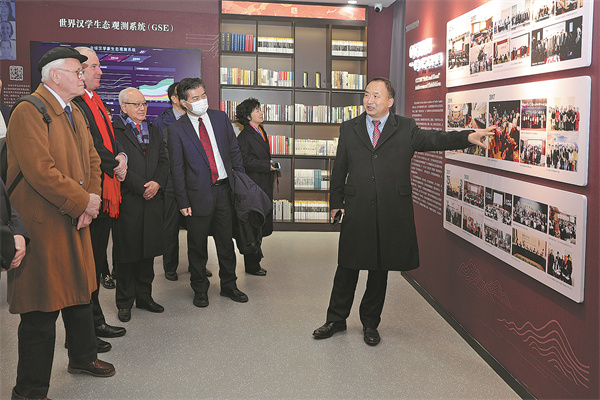

A preferred way to preserve Chinese classics is to analyze, illustrate and present their values to the world, according to German Sinologist Christoph Harbsmeier, professor at the University of Copenhagen.
He spoke via video link on February 7 at the second edition of World Sinology Lecture, held in Qingdao, East China's Shandong province. The event's theme was heritage protection and civilization inheritance.
The monthly lecture program, organized by the Chinese Association for International Understanding and Beijing Language and Culture University, invites China experts from various cultural backgrounds to deliver talks on economics, politics, culture, society, environment and other topics.
In his keynote speech, Harbsmeier introduced the Thesaurus Linguae Sericae (TLS): A Historical and Comparative Encyclopedia of Chinese Conceptual Schemes, which he founded over three decades ago and has been devoted to since.
The platform exemplifies the global promotion of Chinese classics. It has made a comprehensive corpus of classical Chinese texts digitally available, and provided guidance for a systematic and intensive reading of them.
Carsten Boyer Thogersen, the former Danish consul general in Shanghai, discussed the lives of three modern Chinese intellectuals, Lin Yutang (1895-1976), Gu Hongming (1857-1928), and Chen Jitong (1852-1907), who, in their times, wrote in foreign languages to spread Chinese culture and redefine global images of the nation and its people.
Thogersen discussed their thoughts on cultural difference and relations between the East and the West. He argued that the healthy development of world civilization requires coexistence and common prosperity.
Deanna Gao, painter and chairwoman of the Chinese Film Festival in Paris, addressed the development of traditional Chinese painting in France, pointing out that the basis of innovation in Chinese painting is attention to the art's technical and conceptual inheritance.
The lecture was one of a series of recent events to promote Sinology and cultural exchanges held in Qingdao. Among them was the launch of the Latin American Sinology and Culture Center, affiliated with the World Sinology Center of Beijing Language and Culture University.
The center, inaugurated on Feb 5, aims to promote further exchange and mutual understanding between China and Latin American and Caribbean countries, and to serve as a regular academic exchange platform for Sinologists and related institutions, according to Xu Baofeng, director of the World Sinology Center.
A symposium on the development of Sinology in Latin America was held following the launch ceremony, during which scholars and officials from a range of Latin American countries discussed cooperation potential in education and the film and television industry with Qingdao's West Coast New Area, where the center is located.